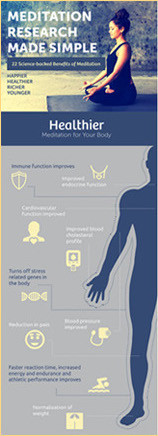RESEARCH
Research on Meditation
From the cover of Time Magazine to more than 3,000 scientific studies, the benefits of meditation are becoming common knowledge.
The Art of Living teaches a meditation technique called Sahaj Samadhi which has been shown in independent research to significantly
reduce anxiety and depression.
Sahaj Researchers from Western University Department of Psychiatry win top award from 17th World Psychiatry Congress in Berlin

Sahaj Samadhi Meditation, an effortless meditation technique with roots in an ancient Indian tradition, has been shown by researchers to both improve depressive symptoms and also to significantly improve variability in heart rate, suggesting a potential long-term benefit in heart health.
Berlin, Oct 23: Research on the effects of Sahaj Samadhi Meditation on cardiovascular health and clinical depression was awarded the best poster presentation from more than 900 presentations at the 17th Annual World Psychiatry Conference held from 8–12 October 2017 in Berlin, Germany.
This randomized controlled research showed the striking beneficial effects of Sahaj Samadhi Meditation, belonging to the category of Automatic Self Transcending Meditation (ASTM), in relieving clinical depression. While conventional treatment produced a 10% remission (or relief) rate, adding Sahaj Samadhi Meditation to patients treatment regimen boosted remission 53%, a 500% increase!
Further, high-frequency heart rate variability, a key factor linked with long-term heart health, and an encouraging predictor of longevity also showed significant improvement.

- 2-Min breathing exercise to balance your brain
- "Breath of Happiness" Guided Meditation MP3
- "Meditation Research" made simple [infographic]
- Request a call from a certified meditation teacher
Sahaj Samadhi Meditation is for overall well-being and vitality, rest and rejuvenation.
The information contained above describes results from research studies, based on an adaptation of the standard Sahaj Samadhi Meditation to special needs groups. This special program included once weekly follow up sessions for 12 weeks, which are not part of the standard program.
Sahaj Samadhi Meditation is not designed to treat or alleviate clinical symptoms. If you suspect you may have a clinical condition, consult your health care professional before deciding whether to enroll in our program.
Hundreds of scientific studies at research institutes throughout the world have documented that meditation significantly reduces stress, depression and anxiety. Yet Sahaj Samadhi Meditation is much more than just a stress management tool. Recent research also shows that meditation puts us on the fast track to becoming happy, relaxed and productive.
Higher Brain Functioning
Studies at the University of Wisconsin have shown that experienced meditators have much higher levels of brain activity in the area of the brain that process positive emotions and less activity in the areas associated with anxiety, depression and other negative emotions.
Research at UCLA further suggests that meditating actually increases the size of the brain region that is associated with positive emotions.In one recent study (Hozel et al., 2011), participants had brain scans before learning to meditate and again eight weeks later. The results were that after only eight weeks, the brain volume in the hippocampus, which is the area associated with learning and memory, showed a significant increase.
This finding was also corroborated in a study cited in the January 2006 article on meditation in TIME Magazine that stated, “One recent study found evidence that the daily practice of meditation thickened the parts of the brain’s cerebral cortex responsible for decision making, attention and memory.
Finally, in studies published in the journal of Perceptual Motor Skills (39: 1031–1034, 1974) and the Academy of Management Journal (17: 362–368, 1974), meditators were found to exhibit:
- Higher IQ and improved academic performance
- More accurate perception
- Improved creativity and problem solving
- Improved focus and memory
- Improved job satisfaction and job performance
- Faster reaction time, increased energy and endurance and improved athletic performance
Reduced Stress
Dozen of studies have shown that meditation can significantly reduce blood cortisol – which is the major stress hormone in humans. This is evident even in brand new meditators. This could explain why meditators report that they not only feel better, but are also found to be significantly healthier since stress is known to either cause or aggravate 80% of all disease.Additional studies have shown that meditators experience
- More balanced hormone function
- Improved immune functioning
- Improved cardiovascular functioning, including lower blood pressure and cholesterol levels
Effects of short-term meditation training on physiological changes before and after stress. Tang Y et al. Proceedings of the National Academy of Sciences, 2007
Better health
A study published in The Journal of Psychosomatic Medicine reported that over a 5-year period, meditators experienced reduced incidences of:
- Cancer cases reduced by 55%
- Cardiovascular Disease cases 88%
- Hospital Admissions by 55% and
- Total Medical Expenses by 67%
Reference: Psychosomatic Medicine, Vol 49, Issue 5 493-507, 1987
An additional study was published in the Journal of Psychosomatic Medicine concluding that meditation produces lasting positive changes in the function of the immune system and even slowed the progression of HIV.
Researchers at Wake Forest University Medical Center published a study measuring the physical effects of meditation on pain. According to Dr. Fadel Zeidan, lead author of the study stated, “This is the first study to show that … meditation training can dramatically reduce both the experience of pain and pain-related brain activation. In fact, meditation produced a greater reduction in pain than even morphine or other pain-relieving drugs in some subjects.”
Improved Performance
Studies published in the Academy of Management Journal, Journal of Perceptional Motor Skills and elsewhere reported that meditation resulted in:
- Higher IQ
- Improved academic performance
- More accurate perception
- Heightened creativity and problem solving ability
- Better focus and memory
- Greater job satisfaction and job performance
Further studies conducted on meditators as reported in the Journal of Neuroscience in April 2011 showed that meditation improves:
- Reaction time
- Energy levels
- Endurance
- Athletic performance
Quality of Life and Longevity
An study in The Journal of Personality and Social Psychology demonstrated (or found) that meditators exhibited increased longevity and better quality of life.
Increased longevity
The researchers also found that meditators displayed:
- Better mental functioning
- More energy
- Feeling more youthful
- Less illness
- Decreased hospital and medical care
- Increased Longevity
Additionally, the Journal of Alternative & Complementary Medicine reported that in an 8-week meditation study in patients with memory loss, meditation was associated with positive changes in mood and decreased anxiety. (Moss et al., Journal of Alternative & Complementary Medicine, 2012)
Finally, the journal of Aging, Neuropsychology, and Cognition reported that long-term meditators who were over 55 years of age were found to have better attention, memory, and vigilance than those in the control group. (Prakash et al., Aging, Neuropsychology, and Cognition, 2011)
Mental Health and Emotional Well-Being
Tests carried out at the University of Wisconsin in Madison showed a “remarkable range of results in meditation practitioners,” including:
- a high level of activity in the parts of the brain that help to form positive emotions, such as: happiness, joy, and self-control, and
- a decreased level of activity in the parts of the brain associated with negative emotions like depression, self-centeredness, and lack of happiness.
Additionally there was seen a calming of the area of the brain that triggers fear and anger as well as a change in the section of the brain that controls the ability to reach a state of inner peace even when facing extremely disturbing circumstances.
An article ( http://www.mayoclinic.com/health/meditation/HQ01070) published in the online Journal of the Mayo Clinic states: "Meditation can give you a sense of calm, peace and balance that benefits both your emotional well-being and your overall health. And these benefits don’t end when your meditation session ends. Meditation can help carry you more calmly through your day and can even improve certain medical conditions. When you meditate, you clear away the information overload that builds up every day and contributes to your stress."
The emotional benefits of meditation include:
- Gaining a new perspective on stressful situations
- Building skills to manage your stress
- Increasing self-awareness
- Focusing on the present
- Reducing negative emotions